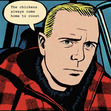5 Easter

May 18, 2025
Revelation 21.10, 22-22; John 13.31-35
+Last Wednesday, after the Wednesday evening Eucharist, at supper at theRustica Tavern, the St. Stephen’s group had a discussion about the so-called “LastTimes.”
Kristine in particular was sharing someinteresting things from her own religious upbringing about this.
No doubt, you too have encountered otherChristians who have told you things like this:
“You know we’re in the last times, right?”
Or,
“When the Rapture comes, you want go with it,because to be left behind is terrible.”
I personally never understood these commentsuntil I later heard that they come from some Evangelical churches that havefound these interpretations of the Book of Revelation to mean that what iswritten in that book is happening right now.
And with the popularity of such awful booksas the Left Behind series (which Ipersonally find to be major manipulations of scripture, not to mention verybadly written books), we have seen even more clearly some Christian’s ideas ofhow the Book Revelation somehow is interpreted in the light of current events.
Later, as I sort of studied it a bit, I founda big problem with such teaching:
Almost every Christian since the time ofJesus believed they were in the “end times.”
People thought it was the end times when theBlack Death rolled through Europe.
People thought it was the End Times when theProtestant Reformation raged, or when the Turks invaded Europe or when theFrench Revolution happened.
People thought it was the end times whenWorld War I came.
People thought it was the End Times duringthe 1918 Flu Epidemic.
People definitely thought it was the endtimes when Hitler rose to power.
People in the 1950s were saying it was theend times with the Communist threat from Russia and China.
Or they were saying it was the end of timeswhen kids started listening to Rock and Roll or the Beatles came to the U.S, oranytime during the very tumultuous 1960s.
Back in the 1980s, I remember my aunt, whobelonged to the First Assembly of God Church, saying it was the end timesthen.
This was also the height of a thing calledthe “Satanic panic.”
People of my generation definitely remember howwe were told by some groups of evangelical Christians that all the rock musicwe listened to had hidden satanic messages, or if you played a record backwardit would reveal some demonic message.
I even remember my aunt saying that we shouldnot have VISA cards because VISA was a clever guise for the Mark of theBeast—the numbers 666.
Certainly, people thought it was the end ofthe world five years ago when the Pandemic was at its worst.
I remember everyone playing “It’s the End ofthe World As We Know It” by R.E.M.
If we were to believe everyone who cried itwas the end times, we could honestly say that the end times have been happeningfor at least 2,000 years.
I solved my confusion about this issue by doingthe only thing I could do in the face of all that confusion:
I simply re-read the Book of Revelation frombeginning to end.
And you know what happened?
I was able to claim—or re-claim—it, andhelped me toread it anew.
AndI was able to see that the Book of Revelation really isn’t about “End Times”
Thereis no Rapture in the Book of Revelation.
Still,I think there are a lot of us who feel very differently about the Book ofRevelation.
Revelationis a strange book.
Itcan be a frightening book.
It’scertainly not my favorite book of the Bible.
But—andI know this might seem strange to many Christians— I don’t see it as a book ofprophecy, as many Christians do.
Idon’t see it saying anything definitely about future governments or somemessianic Anti-Christ in our midst or that we are living in the so-called “lastdays” or what have you.
Mindyou, I do believe “anti-Christs” come and go through history.
Ido believe that powerful people who represent every anti-Jesus, anti-Christianideals which are opposite of the Christian express of loving God and lovingothers and respecting the worth of dignity of all peoples are real, and thosepeople are, by definition, the anti Christ.
But,for that matter, anytime any of us run counter to these Christian ideals, wetoo become kind of “anti-Christs” to those around us.
Still,what I do see the book of Revelation doing is speaking to us through somebeautiful and powerful poetry on what is happening in our lives, rightnow, as Christians, and about how, in the end, Christ is victorious.
Ithink it is important for us to re-claim Revelation in this way —and, in doingso, re-read it with a new lens.
In our reading this morning from Revelation, we find some very strange esotericimages—not an uncommon thing when we read Revelation.
Wefind this morning these images of a new heaven and a new earth, of this newJerusalem, where death is no more or tears or crying.
Itis a place of beauty and glory.
Itis a place of unending life.
Andit is here that I think the Book of Revelation speaks loudly to us.
Evenwe, as Christians, sometimes struggle with the reality of death in our lives.
Evenwe fear it at times.
Andthat is all right.
Thatis normal.
Ofcourse, death is a part of life, and certainly it’s part of my job as a priest.
Iknew that going into it.
But,let me tell you: it still is hard, often.
Andfor people who have to deal with this mystery of death on a regular basis,there have to be ways to find strength and comfort in the midst of death.
Oneof the ways I find my way through this sometimes constant dealing with death isby turning to the scriptures.
Thereis a common theme we find through all Scripture.
Andthat common theme is this:
thedefeat of death.
Oras the great Episcopal theologian William Stringfellow (one of my favorites!) calledit: “authority over death.”
Iagree with him 100%.
Ithink he is absolutely right about that.
Stringfellowsaw it most profoundly in the life of Jesus.
Therewe see this authority over death most profoundly.
Wesee it every time Jesus healed the sick, calmed the storms, cast out demons,ate with sinners, cleansed the temple, raised the death, carried the Cross.
Andof course, in the Resurrection, which we are still celebrating in this seasonof Easter, it is all about authority over death.
Inall of this, we see the God of life—God in Jesus—being victorious over death.
This view of life over death speaks to us most profoundly during this Easterseason.
We,as Christians, cannot let the power of death control and direct our lives.
AsChristians, as followers of Jesus who crossed that awful boundary between lifeand death, and came back, we must truly be defiant to death.
Ofcourse, that ultimate victory over death happens only when we can face deathhonestly.
Truevictory over death is when we can see death in the light we hear about intoday’s reading from Revelation.
Onlythen do we realize that death has no victory over us.
Becauseof what happened on Easter, because of the Resurrection, because Jesus did die,yes, but God raised him from that tomb, and because Jesus walked victoriousupon the chains of death, we know now death does not have the last word in ourlives.
But,for us Christians, we can’t be stuck in such death.
Wemust live.
Andwe must move forward.
Wemust stand up againstdeath.
But,standing up to death, even when we’re sick of it, is not easy.
Choosinglife, with all its uncertainties, can be scary.
Evenwhen moving forward into life and living our lives fullyand completely, we realize it can be frightening.
Weare, after all, heading into the future which is unknown to us.
But that, again, is what I love about Revelation.
WhatRevelation promises to us, through all that poetry and imagery, is that deathwill lose, hatred will lose, violence will lose, evil will lose, war will lose,racism will lose, dictators and despots will definitely lose—and goodness, andholiness and LIFE will be victorious.
Thatisn’t wishful thinking. That’s isn’t beingnaïve.
Rather,this is what it means to be a Christian.
Thisis what it means to believe in the God of life.
"See, the home of God is among mortals,” St. John tells us inour reading for today.
“[God] will dwell with them as their God;
they will be [God’s] peoples,
and God…will be with them;
…will wipe every tear from their eyes.
Death will be no more;
mourning and crying and pain will be no more,
for the first things have passed away."
Those are words of absolute and glorious victory.
Butmore so, they are words of life—of a life that goes on forever and ever.
Aswe travel through these last days of Easter, let us do so with true Easter joy.
Letus do so rejoicing from the very core of our bodies.
Weare alive.
Thismorning, we are alive.
Lifeis in us.
Weare followers of Jesus.
God’sholy Spirit lives and breathes within us!
Weare filled with life and love.
Aswe heard Jesus say in our Gospel reading for today, “I give you a newcommandment, that you love one another. Just as I have loved you, you shouldlove one another. By this everyone will know that you are my disciple, if youhave love for one another.”
Thosewords are our words this morning as well.
Weare filled with love and life.
Weare celebrating love and life.
Andit is all very, very good.
Wehave much to be thankful for and in which to rejoice.
So,let us be thankful for this life.
Letus rejoice in it.
Andlet us realize that in rejoicing in our lives and in the life within each ofus, God has truly prepared for us, as we heard in our collect this morning,“such good things as surpass our understanding.”
I’mgoing to close today with the lyrics to a song I heard (and saw) on Tiktok theother day by a performer Nathan Evans Fox, who is a “leftist Christian from theOzarks.”
It’scountry music, and I’m not a real big fan of country music.
Butthis one I like.
Thisparticular song, “When the Lord Comes Back,” reminds us that all those peoplewho look with joy for the End Times to come because they think they’re getsaved while everyone else gets sent off to hell—well, those people might be infor a real big surprise.
Ialso want to say, I don’t agree with everything in this song, but be openminded as you heard the lyrics.
Whenthe Lord comes back
Aintgonna be no cops
Youcan cook your own
Andsmoke your crops.
Allthe boys gonna wear
Thepretty things
Whenthe Lord comes back
Aintgotta prove a thing
Whenthe Lord comes back
I’mgonna drive real slow
Gonnago wherever the spirit goes
Gonnadawdle and piddle and talk and cuss
Aintno boss gonna make a fuss
Whenthe Lord comes back
I’mgonna drive real slow
Wellevery high place
gonnabe brought low
Whenkingdom comes
We’llwant for nothing
It’sjust a long table
Amess of beans and honey buns
Thetrucks are small
Thetrains are late
Menpick up their dinner plates
Aintnobody sees that debts are paid
Theguns are all for shootin’ clays
Theguns are all for shootin’ clays
Whenthe Lord comes back
Therich get scared
Aintgotta act mean to
Betreated fair
Allthe living’s honest
Anddying too
Ourbodies return
Asheirlooms
Couldalready come
Atime or two
Andthey kill Him like
Theytend to do.
SoI’m praying for
Themighty to fall
Elseaint no use
Inprayer at all
Whenthe Lord comes back
I’lldo my best
Toshare my okra and cigarettes
Breakevery law I can’t respect
Leavesome tall grass for all the critters rest
Don’tsmoke cigarettes, but pray—pray hard!—for the mighty to fall.



